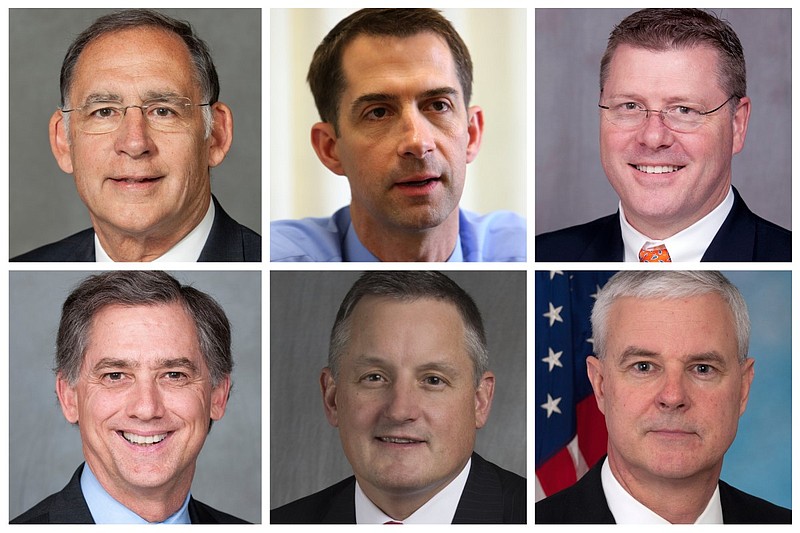WASHINGTON -- Millions of dollars in federal funding could be coming to Arkansas if Congress passes its proposed $1.7 trillion spending package this week.
Congressional appropriators unveiled the 4,155-page bill early Tuesday with lawmakers trying to pass a spending measure before the weekend, and thereby avoid a government shutdown. The Senate voted Tuesday to proceed and begin debate on the legislation. Arkansas Sens. John Boozman and Tom Cotton supported the motion.
"The omnibus is the last thing we have to do to close out a very successful 117th Congress, and we've taken another step -- a major step -- towards reaching the goal line," Senate Majority Leader Charles Schumer, D-N.Y., said on the Senate floor.
The legislation -- a combination of several appropriations measures -- allocates $858 billion for defense spending and $772.5 billion for nondefense discretionary programs, according to Senate Appropriations Committee Chairman Patrick Leahy, D-Vt. The measure would fund the federal government through September when the current fiscal year ends.
The legislation includes funding for thousands of projects requested by lawmakers' home states and districts. Congress restarted this practice, known as earmarks, at the start of the current Congress after an 11-year pause over corruption concerns. Lawmakers previously established a 1% cap on discretionary spending for these projects in the current fiscal year. Legislators must additionally submit certification that they nor their immediate family members have any financial stake in requested projects.
Sixty-four senators -- including Boozman, of Rogers -- and 341 House members -- a group with Reps. Rick Crawford, Steve Womack and Bruce Westerman -- submitted project requests. Cotton, of Little Rock, and Rep. French Hill, R-Little Rock, did not make any requests.
In total, the Arkansas delegation received approval for 36 projects totaling $157.8 million.
Funding for submissions varies. For Boozman, the amounts range from $117,000 for the wastewater treatment plant at the Dale Bumpers National Rice Research Center to $14 million for work related to water depletion in the Bayou Meto basin. Other notable projects of the senator include expanding nursing education at Arkansas State University Beebe, interchange and widening work on U.S. 412 in northern Arkansas, and renovating state fish hatcheries in Benton and Lonoke counties.
Legislators from both chambers could seek funding for the same project. The appropriations measure allocates $7 million for an access road at Northwest Arkansas National Airport, a priority of both Boozman and Womack, also of Rogers. Boozman, however, requested $40 million for the project compared with Womack's $7 million submission.
A significant portion of the measure dedicates funding for federal agencies and initiatives. As the top Republican on the Senate Agriculture, Nutrition and Forestry Committee, Boozman and his colleagues advocated for agriculture-related efforts and funding, such as $250 million for American rice producers affected by fertilizer prices. Two studies from Texas A&M University note rice farmers are paying more for fertilizer partly because of supply chain disruptions.
Agriculture Committee members also pushed for updates to the national summer food service program. Eligible families would receive $40 a month per child for groceries and have flexibility with rural food delivery services.
Chairwoman Debbie Stabenow, D-Mich., noted the change would give healthier food options to 29 million children.
"I am pleased that we came together to close the loop on several outstanding ag and nutrition concerns," Boozman said in a news release.
The spending package also contains multiple pieces of legislation. Lawmakers inserted a bill requiring the U.S. Department of Agriculture to establish efforts for farmers to participate in carbon markets. The Senate passed the Growing Climate Solutions Act in June, but the House of Representatives has not taken any action.
Legislators inserted language prohibiting the use of the social media app TikTok on certain government phones. The move stems from concerns about the app, Chinese parent company ByteDance Ltd. and China's ability to access user data. The ban would specifically apply to executive agencies with exceptions related to law enforcement and national security interests.
The Senate passed legislation earlier this month enacting the ban. Cotton -- who has described TikTok as "one of the most massive surveillance programs" -- co-sponsored the bill.
The spending package would additionally overhaul the Electoral Count Act, an 1887 law establishing guidelines for Congress' certification of presidential election results. The legislation would ensure state electors follow the popular vote and define the vice president's role during Congress' certification as a "solely ministerial" position. The threshold for challenging election results would increase to one-fifth of both congressional chambers.
The inclusion stems from former President Donald Trump's attempt to discredit the results of the 2020 presidential election and efforts to overturn Joe Biden's victory.
Congress agreed last week to support a continuing resolution extending the shutdown deadline to Friday. Some Republicans on Capitol Hill oppose Congress' consideration of a spending package, insisting on a short-term funding bill giving the incoming Republican House a say on government funding.
Boozman, Cotton and Womack supported last week's continuing resolution, which continues spending only at current levels with no funding for new programs.
The first votes in the House of Representatives will happen this evening. Democratic leaders have advised lawmakers they should expect to stay in Washington, D.C., until work on the spending package is complete.
